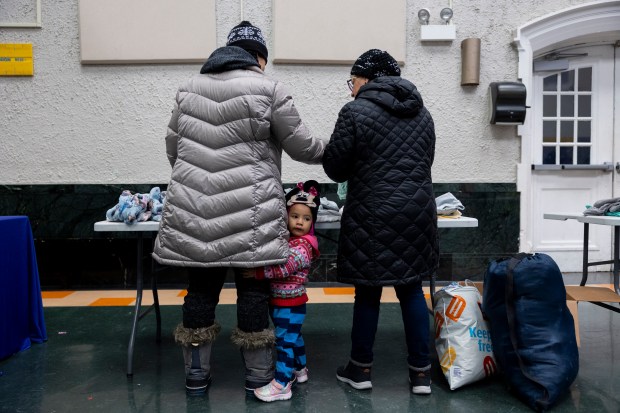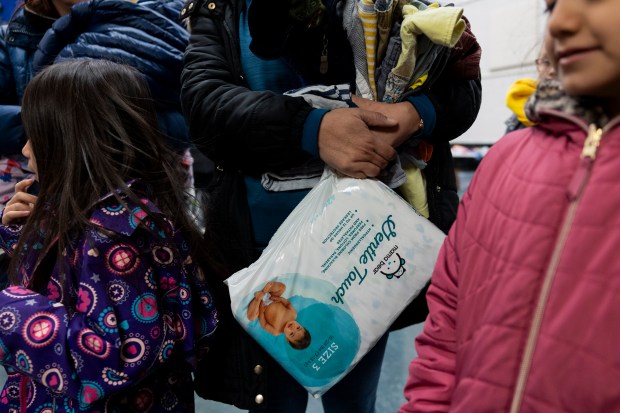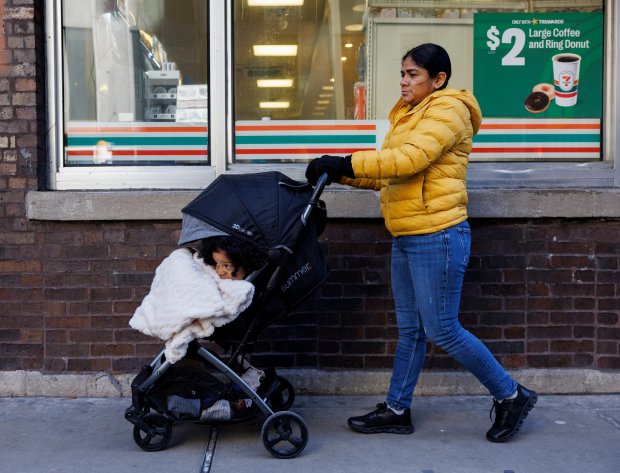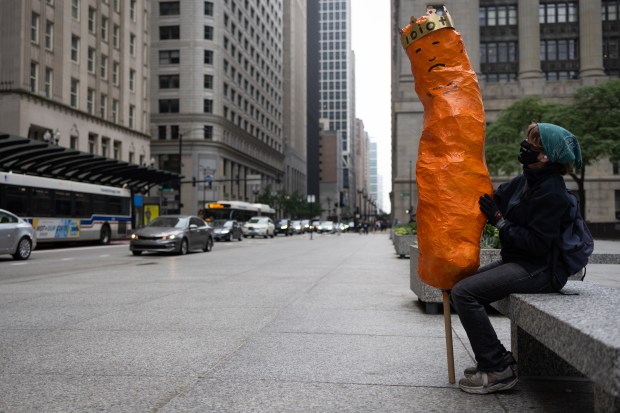Migrant families are reporting a shortage of diapers in the city’s shelters, forcing some parents to reuse dirty diapers on their babies, according to migrants and a network of volunteers working closely with those living in shelters.
The desperation of the families has galvanized mutual aid groups to collect diapers, toilet paper and other hygiene products after city officials told them they couldn’t keep up with supplies, said Anna Gomberg, a lead volunteer helping migrants on the North Side.
Hygiene products, including diapers and toilet paper, are provided by the city’s emergency operations center’s logistics section, which was created to coordinate and allocate resources for migrants. The city receives supplies from the Illinois Emergency Management Agency, the Federal Emergency Management Agency and outside vendors.
Mary May, a spokesperson for the city, acknowledged that “supply shortages from IEMA and FEMA can result in temporary shortages of some supplies” for migrants, but said in the statement last Friday that officials had “received a large delivery of supplies” that included diapers to deliver to shelters.
“Shelter staff can only distribute what they have in supply. If inventory levels of certain items get low, emergency deliveries of the items are made,” May said.
On Wednesday, Esperanza Gil, 39, said she has constantly worried about having enough diapers for her 2-year-old since they arrived at the Inn of Chicago in Streeterville about three weeks ago. Diapers are restocked every few days, she said, but there are too many families with babies that need them.
She said she sometimes has to reuse diapers for her son.
“What else can I do?” she asked.
She said migrants have begun to gather in the room where they eat at the Inn to pool their resources.
“Because we can’t work, we all don’t have many options,” she said.
Migrant families at the Inn of Chicago, one of the largest city-run migrant shelters, began to report the need for diapers more than two weeks ago, said volunteers, who quickly learned that many more were in need in shelters across the city. Katharina Koch Staley, a volunteer helping migrants, said Tuesday a shelter in Rogers Park was in need of toddler diapers.
Elizabeth Huggins, a volunteer who was helping migrants when they were staying at the Grand Central District (25th) police station, said she is concerned about the ability of asylum-seekers to pay for diapers if they have little to no steady income, and worried about the sanitation inside crowded shelters.
“When you’ve got children, their bodies are learning to adapt to diseases. You don’t want to reuse things like diapers. … We are exposing people to feces and urine,” she said. “We can expose them to what made them sick or make them sick all over again.”
More than 36,000 migrants, mostly from Venezuela, have arrived in the city since August 2022, when Texas Gov. Greg Abbott began busing asylum-seekers from the southern border to sanctuary cities. City and state officials have struggled to keep up with the number of migrants in need.

More than 12,100 migrants live in the city’s 23 shelters, which are managed by Favorite Staffing under a contract that has cost the city millions of dollars and garnered controversy for its sizeable overtime.
Favorite staff submit order requests with the logistics team and make sure residents receive what’s needed, May said.
Volunteers say it is not clear who rations diapers and toilet paper if shelters experience a shortage. The city did not respond to a question about who is in charge of rationing the supplies.
Outside the largest city-run shelter on the Lower West Side that houses over 2,000 migrants, Angel Cardena, a father from Maracay, Venezuela, stood outside in flip-flops in 20-degree weather Wednesday holding his 3-year-old son.
Cardena, 25, said he has been at the shelter for about a month but has not received diapers from shelter staff.
“Some people get more help than others,” he said. “But the majority of people here buy their own supplies.”
Migrants sleep in large rooms with hundreds of other people and are provided with little to no supplies or care, he said. He hasn’t been able to find work, partly because the single dad doesn’t want to leave his son alone at the shelter.

Last Saturday, several migrant parents living in city-run shelters picked up diapers at a monthly community store set up by Southwest Collective, a mutual aid group, at Edwards Elementary in Archer Heights.
Jaime Groth, of Southwest Collective, said that volunteers told migrant parents that diapers would be available at the donation store. Some parents took several buses and trains to pick up the diapers, Groth said. Out of about 30 boxes of diapers of different sizes, they only had two boxes left.
Groth said that parents are also requesting formula and powder milk because the children are weak and malnourished. She urges the public to step in to help.
“There’s a lot of people and not enough diapers and the more we supply, the more people come and the more things we need,” Groth said.
May said that those who wish to help can purchase items directly from an Amazon Wish List set up in partnership with Instituto del Progreso Latino. The Wish List is regularly updated to meet the needs of migrants in the city’s shelters.
The wish list can be found at Chicago.gov/support (donations) or at InstitutoChicago.org. Additional ways to donate and volunteer can also be found at Chicago.gov/Support.
Website to donate items to Southwest Collective: https://www.swcollective.org/freebies-for-families





